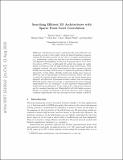| dc.contributor.author | Tang, Haotian | |
| dc.contributor.author | Liu, Zhijian | |
| dc.contributor.author | Zhao, Shengyu | |
| dc.contributor.author | Lin, Yujun | |
| dc.contributor.author | Lin, Ji | |
| dc.contributor.author | Wang, Hanrui | |
| dc.contributor.author | Han, Song | |
| dc.date.accessioned | 2022-07-12T13:12:22Z | |
| dc.date.available | 2022-07-12T13:12:22Z | |
| dc.date.issued | 2020 | |
| dc.identifier.uri | https://hdl.handle.net/1721.1/143668 | |
| dc.description.abstract | © 2020, Springer Nature Switzerland AG. Self-driving cars need to understand 3D scenes efficiently and accurately in order to drive safely. Given the limited hardware resources, existing 3D perception models are not able to recognize small instances (e.g., pedestrians, cyclists) very well due to the low-resolution voxelization and aggressive downsampling. To this end, we propose Sparse Point-Voxel Convolution (SPVConv), a lightweight 3D module that equips the vanilla Sparse Convolution with the high-resolution point-based branch. With negligible overhead, this point-based branch is able to preserve the fine details even from large outdoor scenes. To explore the spectrum of efficient 3D models, we first define a flexible architecture design space based on SPVConv, and we then present 3D Neural Architecture Search (3D-NAS) to search the optimal network architecture over this diverse design space efficiently and effectively. Experimental results validate that the resulting SPVNAS model is fast and accurate: it outperforms the state-of-the-art MinkowskiNet by 3.3%, ranking 1 on the competitive SemanticKITTI leaderboard. It also achieves 8–23 computation reduction and 3 measured speedup over MinkowskiNet and KPConv with higher accuracy. Finally, we transfer our method to 3D object detection, and it achieves consistent improvements over the one-stage detection baseline on KITTI. | en_US |
| dc.language.iso | en | |
| dc.publisher | Springer International Publishing | en_US |
| dc.relation.isversionof | 10.1007/978-3-030-58604-1_41 | en_US |
| dc.rights | Creative Commons Attribution-Noncommercial-Share Alike | en_US |
| dc.rights.uri | https://creativecommons.org/licenses/by/4.0/ | en_US |
| dc.source | arXiv | en_US |
| dc.title | Searching Efficient 3D Architectures with Sparse Point-Voxel Convolution | en_US |
| dc.type | Article | en_US |
| dc.identifier.citation | Tang, Haotian, Liu, Zhijian, Zhao, Shengyu, Lin, Yujun, Lin, Ji et al. 2020. "Searching Efficient 3D Architectures with Sparse Point-Voxel Convolution." Lecture Notes in Computer Science (including subseries Lecture Notes in Artificial Intelligence and Lecture Notes in Bioinformatics), 12373. | |
| dc.contributor.department | Massachusetts Institute of Technology. Department of Electrical Engineering and Computer Science | |
| dc.relation.journal | Lecture Notes in Computer Science (including subseries Lecture Notes in Artificial Intelligence and Lecture Notes in Bioinformatics) | en_US |
| dc.eprint.version | Author's final manuscript | en_US |
| dc.type.uri | http://purl.org/eprint/type/ConferencePaper | en_US |
| eprint.status | http://purl.org/eprint/status/NonPeerReviewed | en_US |
| dc.date.updated | 2022-07-12T13:07:18Z | |
| dspace.orderedauthors | Tang, H; Liu, Z; Zhao, S; Lin, Y; Lin, J; Wang, H; Han, S | en_US |
| dspace.date.submission | 2022-07-12T13:07:22Z | |
| mit.journal.volume | 12373 | en_US |
| mit.license | OPEN_ACCESS_POLICY | |
| mit.metadata.status | Authority Work and Publication Information Needed | en_US |
